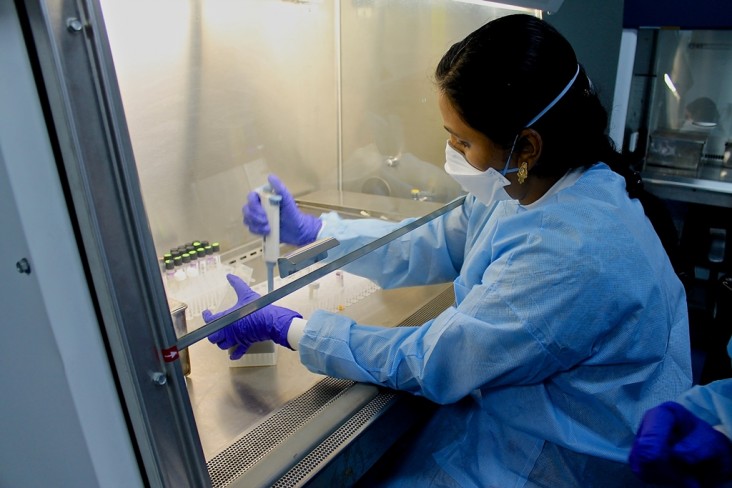India
- History
- Our Work
- Transforming Development Through Innovation & Partnership
- U.S.-India Triangular Cooperation
- Partnership for Energy Access and Security
- Partnership for Sustainable Forests in India
- Partnerships for Health
- Partnership for Education
- Partnership for Water Sanitation and Hygiene (WASH)
- Partnership for Food Security
- Partnership for Gender Equality
- Investing in Afghanistan
- Foreign Assistance Data
- Newsroom
- Newsletters and Fact Sheets
- Speeches
- Resources For Implementing Partners (RFIP)
- Careers
- Partnership Opportunities
- Success Stories
Speeches Shim

Since 1998, USAID has partnered with the Government of India to combat tuberculosis (TB), investing more than $140 million to help diagnose and treat 15 million people with the disease. India has the largest number of TB cases in the world—more than a quarter of the global TB burden. The World Health Organization (WHO) estimates that 2.74 million people in India are infected with TB annually, and more than 410,000 people die from the disease. USAID supports the national movement to make India TB-free by leveraging local experts, financial, and technical resources to accelerate the national TB program and increase cross-sectoral support for combatting the disease.
USAID/INDIA PROGRAMS
USAID partners with technical experts, the Revised National TB Control Program, the private sector, civil society, communities, and patients to achieve a TB-free India. USAID supports both the supply side of controlling TB, in the form of enabling diagnosis and using technology for treatment adherence, as well as the demand side of care, in the form of patient support services to enable patients to access and sustain treatment. USAID’s TB programs provide support at the district, state, and national levels to demonstrate new models and catalyze change in the health system.
INTEGRATED CARE AND PREVENTION:
- Improving the Supply of TB Diagnostics and Treatment: USAID’s TB programs in India increase case detection as well as improve treatment adherence. Through advocacy and community engagement, USAID support is educating people on the symptoms of TB as well as the importance of getting tested, while simultaneously reducing stigma around the disease. USAID programs are demonstrating new models to increase access to diagnostics, including designing an e-training module for laboratories. USAID supports improved treatment practices, including using technology to promote treatment adherence and institutional strengthening to improve the quality of existing services. At the national level, USAID supports policies and guidelines that facilitate improved diagnosis and treatment, including the development of modules and tool kits for community engagement, partnership guidelines, workplace policy interventions, and building a network of TB Champions.
- Building Demand through Strengthening Patient Support Services: In addition to ensuring quality diagnosis and treatment is available to patients with TB, USAID is working to ensure TB patients are able to access, and maintain, their treatment course. This is done by ensuring knowledge of and access to nutritious foods, educating families on the importance of completing treatment, and supporting vouchers for transportation. Programs also work in the community to trace contacts of TB patients as well as link TB patients with co-morbidities, such as HIV and diabetes, with care. USAID is supporting the use of phone applications and technology to remind patients to take their medication. Nationally, USAID is working to develop patient support strategies as well as support direct benefit transfer systems.
- Addressing Drug-Resistant (DR) TB: India has the highest number of DR-TB cases in the world, about a quarter of the world’s total. Treatment of DR-TB cases requires substantial time and resources. USAID helps address this growing epidemic by supporting a national unit that helps the Government to address issues related to DR-TB, including applying newer diagnostics and shorter treatment regimens and addressing antimicrobial resistance.
RAISING AWARENESS THROUGH PUBLIC ADVOCACY:
A high-level USAID-India End TB Alliance was formed in December 2018 to maximize the impact of USAID’s TB investments in India. The Alliance comprises of ten leading experts in the public and private sector whose participation will raise the profile of USAID’s TB investments and generate new ideas to combat TB in India. Alliance members include industry and civil society leaders, academics, scientists, civil servants/technocrats, innovators, investors, and the Indian diaspora in the United States. In April 2019, USAID also launched a bold new initiative designed to galvanize India’s corporate sector in the fight TB. This TB platform recognizes corporations for their commitment and contributions to ending TB, and links them with the resources they need to better plan and implement TB programs.
To accelerate action, USAID recently announced a new innovative model, “The Global Accelerator to End Tuberculosis” that will leverage additional resources from countries, private sector partners, and other local organizations in order to meet the UN target of treating 40 million people by 2022. USAID/India is currently in the process of designing a research and development intervention to rapidly demonstrate and rigorously test person-centered, high-impact and novel solutions that can accelerate the Government of India’s efforts to eliminate TB by 2025.
TB in India - At a Glance
- 2.74 million new TB cases a year
- 410,000 deaths from TB each year
- 135,000 multidrug-resistant TB cases per year
- 86,000 TB-HIV cases per year


Comment
Make a general inquiry or suggest an improvement.